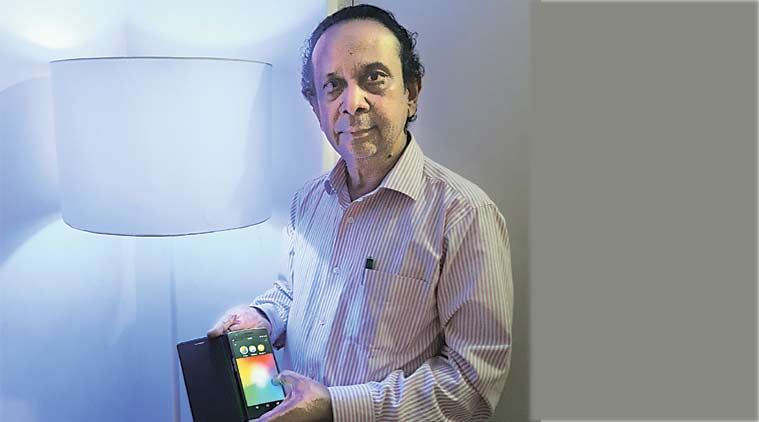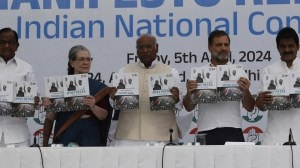- India
- International
All of Einstein’s theory can be reinterpreted using atoms of space concept: Thanu Padmanabhan
Wiltshire paid for a lamp worth $ 200 “to help Padmanabhan better illuminate his calculations of the darkness of the universe”.
 Thanu Padmanabhan
Thanu Padmanabhan
Pune-based theoretical astrophysicist Thanu Padmanabhan has won a decade-long bet with a physicist from New Zealand, David Wiltshire, regarding the nature of dark energy. Padmanabhan, a professor at the Inter University Centre for Astronomy and Astrophysics (IUCAA), Pune, had suggested in 2006 that dark energy in the universe is just a mathematical term called the “cosmological constant” that Einstein had initially proposed in his general theory of relativity and that all observations in the next ten years will be consistent with this interpretation. At the 13th international symposium on cosmology and particle physics (CosPA 2016) that concluded on December 2, Wiltshire, a professor in the Department of Physics and Astronomy at the University of Canterbury, New Zealand, conceded the bet. Wiltshire paid for a lamp worth $ 200 “to help Padmanabhan better illuminate his calculations of the darkness of the universe”. Excerpts from an interview with ANURADHA MASCARENHAS
What is dark energy?
It has been known for decades that the universe is expanding. But until the late 1990s, it was believed that the expansion rate of the universe was slowing down, much like a car that is decelerating. Studies in the late 90s disproved this and showed that the expansion rate of the universe was, in fact, increasing — that is, the universe is like an accelerating car! This accelerated expansion demanded that nearly 70 per cent of the energy driving the expansion must have very peculiar properties. This peculiar component was dubbed as dark energy
Watch what else is making news:
What is cosmological constant and how is it different from dark energy?
There is another way to explain the accelerated expansion of the universe. This is to modify the Einstein equation, which describes the expansion of the universe by adding to it an extra term of specific nature. This term contains a constant called the cosmological constant. By introducing this term, you can explain all the observations without having to introduce extra matter or energy with peculiar properties. In that sense, cosmological constant behaves like the dark energy but it is just a mathematical modification of the equation.
What is your view of dark energy and why were cosmologists divided on it?

By 2006, I was quite convinced that the accelerated expansion of the universe is entirely due to a cosmological constant and that dark energy is the cosmological constant. While physicists knew that the cosmological constant can explain all the observations, some of them were uncomfortable with its numerical value. To be consistent with observations, you needed an extraordinarily small cosmological constant. Its value is 1 divided by a number made of 1 followed by 123 zeros! It was considered a deep mystery that cosmological constant is so tiny but yet nonzero. One needed a theoretical explanation for this number, which I came up with in 2014.
What was the specific challenge you offered in 2006?
I was working on a deeper interpretation of Einstein’s gravity and I was convinced that I would be able to explain the tiny value of the cosmological constant. So I offered a wager to the audience of astrophysicists at the 23rd Texas Relativistic Astrophysics Symposium, 2006, at Melbourne, that all observations in the next 10 years will be consistent with dark energy being the cosmological constant. In principle, observations could have ruled out this possibility.
If you have won the bet does that mean your theory now holds good?
The only issue anyone had with the cosmological constant was its tiny value. But now that I have a theoretical explanation for this value, I am more than ever convinced that dark energy is the cosmological constant. All that remains is to convince the community that my theoretical explanation is the way forward. This will take time, especially when you are working from India on a non-bandwagon approach, but I am sure it will happen.
You were working on a deeper paradigm of Einstein’s theory. What is that theory and how did you arrive at your theory?
It can best be explained by an analogy. Normal matter, say, a glass of water, looks continuous and smooth. But we do know that it is made of discrete atoms and molecules. Similarly, space (and time) appears continuous but it is like a fluid and is actually made of “atoms of space”. These are extremely tiny structures. The number of `atoms of space’ in one square centimetre will be about 1 followed by 66 zeros! I have shown that one can reinterpret all of Einstein’s theory — and extend it further — using the concept of the atoms of space. I arrived at this from purely theoretical and mathematical considerations while attempting to put together the principles of quantum theory and gravity.
Have there been other scientists, astrophysicists who have taken up similar challenges?
The Kip Thorne-Stephen Hawking-John Preskill bet was a famous bet on the outcome of the black hole information paradox made in 1997 by Thorne and Hawking on the one side and Preskill on the other. Usually these bets are settled in an amicable, friendly and gentlemanly fashion. Earlier, too, I took a bet in 1991 with renowned astrophysicist Jayant Narlikar. I had claimed that all observations in the next two decades, that is, 1991-2011, would be consistent with the big bang model while Narlikar claimed they would not be. He conceded the bet in January 2012.
How important is an international wager to prove or disprove a scientific theory?
A wager does not really play any significant role in proving or disproving a theory on the whole. But it certainly reflects the current thinking of the experts in the field and how proponents and opponents view various possibilities. More importantly, it is lot of fun, especially when one wins it.
More Explained
EXPRESS OPINION
Apr 25: Latest News
- 01
- 02
- 03
- 04
- 05










































